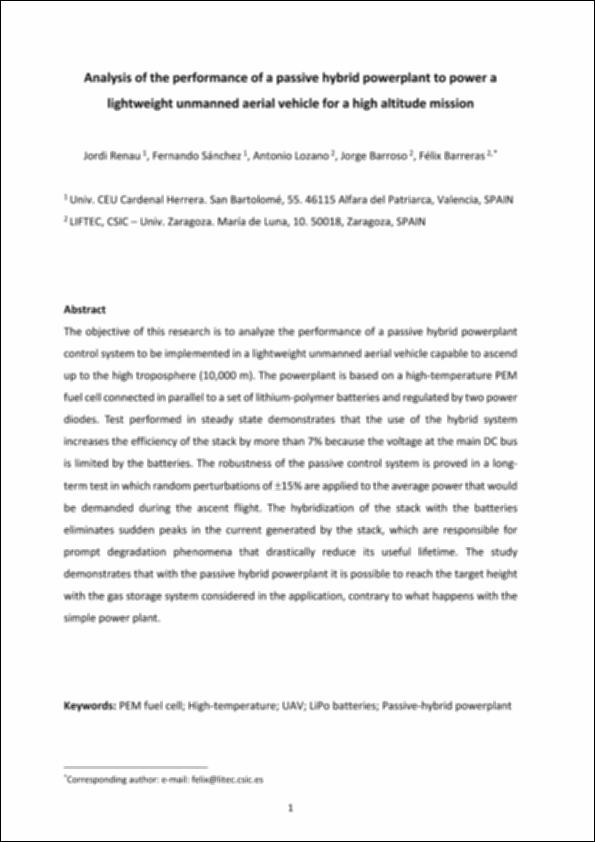Por favor, use este identificador para citar o enlazar este ítem:
http://hdl.handle.net/10637/14845Analysis of the performance of a passive hybrid powerplant to power a lightweight unmanned aerial vehicle for a high altitude mission
| Título : | Analysis of the performance of a passive hybrid powerplant to power a lightweight unmanned aerial vehicle for a high altitude mission |
| Autor : | Renau Martínez, Jordi Sánchez López, Fernando Lozano Fantoba, Antonio Barroso Estébanez, Jorge Ángel Barreras Toledo, Félix Manuel |
| Materias: | Fuel technology; Tecnología de los combustibles; Energy resources; Recursos energéticos; Ingeniería mecánica; Mechanical engineering; Mecánica de fluidos; Fluid mechanics |
| Editorial : | Elsevier |
| Citación : | Renau, J., Sánchez, F., Lozano, A., Barroso, J. & Barreras, F. (2017). Analysis of the performance of a passive hybrid powerplant to power a lightweight unmanned aerial vehicle for a high altitude mission. Journal of Power Sources, vol. 356 (15 jul.), pp. 124-132. DOI: https://doi.org/10.1016/j.jpowsour.2017.04.090 |
| Resumen : | The objective of this research is to analyze the performance of a passive hybrid powerplant control system to be implemented in a lightweight unmanned aerial vehicle capable to ascend up to the high troposphere (10,000 m). The powerplant is based on a high-temperature PEM fuel cell connected in parallel to a set of lithium-polymer batteries and regulated by two power diodes. Test performed in steady state demonstrates that the use of the hybrid system increases the efficiency of the stack by more than 7% because the voltage at the main DC bus is limited by the batteries. The robustness of the passive control system is proved in a long-term test in which random perturbations of ±15% are applied to the average power that would be demanded during the ascent flight. The hybridization of the stack with the batteries eliminates sudden peaks in the current generated by the stack, which are responsible for prompt degradation phenomena that drastically reduce its useful lifetime. The study demonstrates that with the passive hybrid powerplant it is possible to reach the target height with the gas storage system considered in the application, contrary to what happens with the simple power plant. |
| Descripción : | Este es el post-print del siguiente artículo: Renau, J., Sánchez, F., Lozano, A., Barroso, J. & Barreras, F. (2017). Analysis of the performance of a passive hybrid powerplant to power a lightweight unmanned aerial vehicle for a high altitude mission. Journal of Power Sources, vol. 356 (15 jul.), pp. 124-132, que se ha publicado de forma definitiva en: https://doi.org/10.1016/j.jpowsour.2017.04.090 |
| URI : | http://hdl.handle.net/10637/14845 |
| Derechos: | http://creativecommons.org/licenses/by-nc-nd/4.0/deed.es |
| ISSN : | 0378-7753 1873-2755 (Electrónico) |
| Fecha de publicación : | 15-jul-2017 |
| Centro : | Universidad Cardenal Herrera-CEU |
| Aparece en las colecciones: | Dpto. Matemáticas, Física y Ciencias Tecnológicas |
Los ítems de DSpace están protegidos por copyright, con todos los derechos reservados, a menos que se indique lo contrario.


